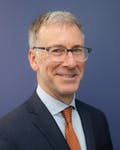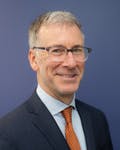Faith & Finance
10 min read

Reflections on Our Sustainability Journey—People and Process Behind the Progress

by David A. Klassen, CFA
President and Chief Executive Officer, Pension Boards-United Church of Christ.
The Pension Boards is sometimes known for frequent one-way communications, in which we inform you of our progress while letting you know how you can utilize our products. And so, the temptation is to do that again here—to outline all our accomplishments in Sustainable and Responsible Investing over the last 10 years.
However much we might have to crow about in this report—particularly given the stellar evaluation we received recently from the United Nations Principles for Responsible Investing (UNPRI) that ranked our activities favorably on an absolute basis and relative to peer pension plan sponsors—that would be missing the point. Just as sometimes it's not the notes that count but the space between them, it is my hope that taking you behind the curtain will illuminate and reveal the process and people behind a decade-long journey and answer the question: How did we get here, and can we be trusted to continue?
A noteworthy but humble place to start would be in 2013, when General Synod addressed fossil fuel investment and called upon numerous entities related to the church to migrate toward best-in-class investments or divestment.
This created palpable tension with Pension Boards’ oft-repeated but sometimes criticized focus on fiduciary duties (yes, the “f” word) to our members. While that stance was appropriate and important, it seemed at odds with being perfectly and consistently aligned with the values and activism of many in our denomination. But there were no manuals at the time and no clear way forward, particularly for those who were trained in fundamental principles of diversification and risk management. It was very helpful, though, that a number of our trustees insisted there would be no financial sacrifice to our sustainable and responsible investing activities. And so the journey began.
Framing Faith and Finance
An important inflection point, clearly borne of a creative impulse to do better, was the way we rallied around a mission statement centered on “Faith and Finance” a decade ago. There were two major threads early on—inside and outside. One was the convening of a group of numerous stakeholders and advisors who helped us frame the apparent contradiction between the two concepts: being faithful stewards of the assets we manage on behalf of our members in alignment with UCC values in regard to people, planet, and principles (faith), and doing well for our members from a financial standpoint (finance).
Outside our walls, our journey included learning from others. I was lucky enough to go to the UK to meet with leaders of the Church of England pension plan and other faith-based investors to discuss ways by which organizational commitments to responsible investing ended up lasting. I left those meetings awake to the idea that a theological starting point and integration of beliefs were drivers to transformation and change, enabling the best organizations to fully embrace and sustain both a mission-aligned approach and good returns.
Supported by this idea of faith and finance, armed with a new understanding of the importance of beginning with theology, our internal transformation gathered steam. A few examples might help here.
We introduced an option for accumulating (actively-employed) participants in the plan—the Northern Trust Global Sustainability Index Fund (GSIF). We were able to act because a reputable product became available at relatively low cost. The science underlying the portfolio construction and security selection was compelling to our staff and the Investment Committee of the Board of Trustees, who recognized and appreciated the best-in-class approach for investors interested in sustainability, while also improving our fund lineup for our participants.
Not coincidentally, in 2016, we embarked upon a search for a new investment advisor. Of great importance was the ability to advise our staff and Investment Committee on sustainable and responsible investing. Underpinning our eventual selection of Goldman Sachs Asset Management (GSAM) was their newly-acquired capability from Imprint Capital, a leading, California-based impact investing pioneer. This further aligned mission, theology, and instincts with capabilities and cutting-edge tools. The new tools included a sustainability framework that remains today.
None of this happens without our people, many of whom you will hear from in this report. I've addressed Investment Committee members and stakeholders of the Faith and Finance Advisory Committee who guided us initially. Importantly, the Pension Boards became stronger as we intentionally focused on recruiting persons motivated to join an increasingly diverse, mission-oriented, faith-based organization and interested in moving faith and finance forward. As if we didn't have enough on our plates, new executive leadership moved us in the area of renewed strategic planning. One early initiative was the establishment of working groups comprised of cross-functional Pension Boards’ staff colleagues. One of those first working groups was the Customer Advocacy Working Group, which quickly identified the ways in which we were indeed insular, and not proactively seeking feedback. This growing appreciation for feedback and the development of that muscle continues to this day.
Momentum became palpable.
The organization wrestled with the implications for faith and finance in various other organizational functions. In some ways the investment group had it easy, as tools became available, like the evaluation of external manager integration of risk factors such as environmental concerns, human rights violations in the supply chain, etc., which enabled us to begin evaluating existing and prospective managers more systemically.
Our internal team became leaders in efforts to add green bonds to our fixed income portfolios. We evolved our exclusionary screens to eliminate coal and tar sands companies. We explored emerging opportunities in private markets with a focus on positive societal impact in areas of climate, health, and educational access. We relaunched our Balanced Fund as the Sustainable Balanced Fund, and hired a new cohort of managers who are experts in the science and application of sustainability.
But you see, I'm bragging again.
If I really think about the ingredients necessary to bake this faith and finance cake on your behalf, I'm most proud of the sustainable nature of the processes and people as much as I am of the accomplishments. Our Board of Trustees has set visionary and aspirational policies born of theological reflection, including foci on climate and Diversity, Equity, Inclusion & Belonging (DEI&B), and have insisted on mission-based metrics while meeting financial goals. Our leadership continues to focus on recruiting a diverse team of committed professionals. Our staff has led a cultural shift away from an ivory tower culture to one where we are insisting on getting feedback from participants. And our Investment Team continues to apply cutting-edge tools to analyze opportunities in both the active and lifetime retirement income portfolios.
In summary, I hope you might take note of our United Nations Principles for Responsible Investing (UNPRI) results, which cap off a decade of organizational improvement toward sustainability and represent a watershed moment. We don’t need to shout from the rooftops. The evaluation is an objective, third-party acknowledgment of where we have been and what we've accomplished over the last decade.
Equally as important is the how. With a solid foundation of people and processes that courageously wrestle with the contradictory concepts of faith and finance, an understanding of the value of diversity, the use of trailblazing investment tools, an appreciation for candid feedback, and a focus on positive societal investment impact, we will realize our commitment to serve you, our valued participants, reliably and sustainably over the next decade and beyond.
Investments with Your Values in Mind
The Pension Boards’ Investment Program aims to provide the highest level of investment performance within the guidelines of the organization and invests assets on behalf of its members for positive impact. We emphasize and support our shared United Church of Christ values such as sacredness of creation, human rights, and underserved & underrepresented populations. Learn more through the 2024-25 Sustainability Report, Why Sustainability Matters.

by David A. Klassen, CFA
David A. Klassen is the President and Chief Executive Officer for the Pension Boards-United Church of Christ, Inc. Previously, David served as Chief Investment Officer for the Pension Boards and United Church Funds for 14 years. David has significant experience in the fields of investment and finance. His Wall Street credentials include working as V.P. and Portfolio Manager at Morgan Stanley Dean Witter and Managing Director and Head of Equities at JPMorgan Chase. In a productive decade away from Wall Street, David graduated from divinity school, earned 4 units of Clinical Pastoral Education (CPE) and was Partner of Springboard Leadership LLC, working with top leaders and organizations to build diverse leadership capacity in the finance, not-for-profit, and government sectors. David earned a B.A. in Accounting from Franklin & Marshall College and a Master of Divinity from Union Theological Seminary, and attended Tavistock Institute’s Leicester Conference on Authority, Leadership and Organization. He is a Chartered Financial Analyst (CFA) and currently is a member of the Board of Trustees of Union Theological Seminary in NYC. In the past, he has served on the Investment Committee of United Church Funds and the Board of Trustees of the Village of Irvington, New York. He currently lives in Brooklyn, New York, is a long time member of Middle Collegiate Church, a United Church of Christ in Manhattan, and he and his wife Susan are parents to three NY-based adult children.
Concerns about a healthy planet and climate change have been hot button issues for some time—and investors are now embracing these themes more fully. They’re looking for ways to help.Andrew Russell
Director of Fixed-Income Investments at the Pension Boards
RELATED ARTICLES
Holistic Approach to Sustainable Investing
Diversity, Equity, Inclusion, & Belonging (DEI&B) Policy to Create a Just and Equitable World for All
POPULAR RESOURCES
Why Sustainability Matters: 2024-25 Sustainability Report
The Pension Boards' 2024-25 Sustainability Report, themed "Why Sustainability Matters," centralizes on the organizations' commitment to corporate social responsibility and responsible investing by way of its journey and recent advancements in four areas: alignment; integration; impact; and engagement.
